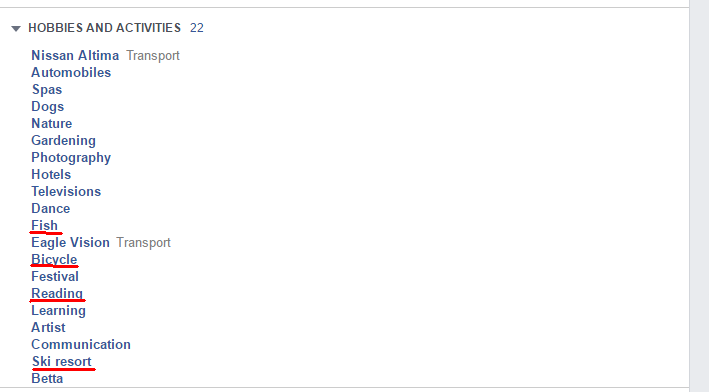Are you using Facebook Advertising and target people by interests? Well, I have not very good news for you – this targeting isn’t as reliable as you may assume.

How Facebook assigns interests to their users?
Let’s check the official documentation. At What is interests targeting? page of Facebook Adverts Help it says the next:
Interest may include things people share on their Timelines, apps they use, ads they click, Pages they like and other activities on and off of Facebook and Instagram. Interests may also factor in demographics such as age, gender and location.
Sounds logical, huh? At the end of the day Facebook is a piece of software and has to guess human interests based on the analysis of their behaviour on their platform and 3rd party website. However taking into account that Facebook is one of the biggest Internet company with thousands of extremely smart people employed I though that that interests are assessed quite intelligently, using trendy and sophisticated methods like machine learning, artificial intelligence etc. Well, seems it isn’t a case.
“Dumb” Facebook
As you see below and check yourself Facebook assesses user interests it in pretty dumb way. How have I found it?
Caveat: the arguments below are based on pretty limited number of data that I have access to.
In some countries including Australia Facebook users can adjust their Ad Preferences. In order to do this you need to visit this page https://www.facebook.com/ads/preferences/ , where all your interests are listed.
Recently I did it and what I’ve seen there really disappointed me, especially because I invested fair amount of money in Facebook ads.
Here is a screenshot of part of my interests, namely hobbies and activities

There are 20 interests listed and you probably noticed that some interests (four) are highlighted in red.
These four interests are only things that really interest me, at least at conscious level. Four out of twenty! That ratio is similar in other areas of interests I checked. More or less accurate data is only about education, workplace – what user explicitly populate when creates and updates account.
Why other interests are there? Well, I’ve probably clicked or liked something related with the topic few or even one time in past. There are different reasons for such clicks: from click bait to a reference from a friend you can’t ignore. The point is that in reality that interest isn’t that high and most probably I’ll ignore advertising related with say gardening.
So a business who hopes that I will be a good target for their seeds or shovels will waste their money showing their ad to me.
I encourage you to check your Ad Preferences. I bet you’ll be surprised.
Based on this I don’t really see high-level artificial-intelligence and sophisticated algorithms carefully analysing big data employed by Facebook. Seems that virtually any single like and click to some topic is counted as an interest.
Is Facebook really dumb ?
I don’t think so. There is no proof for this, so yes, it is a speculations, but for Facebook as a media business that sells advertising it is beneficial to have more people with particular interest in an audience they sell to advertisers.
As an advertiser, would you feel better if you see that there are 100,000 people interested in say Yoga in your metro area or just 10,000? Taking into account fixed costs, which don’t depends on number of clicks (like campaign management, creative assets – ads, landing page, copy) you may decide not to do any advertising if the target audience is too small.
So employing ‘dumb’ interest assessment process Facebook makes the platform more attractive for advertisers:
- Bigger audience
- Lower cost per impression (looks good if you pay on CPM model).
The negative implication is lower CTR (Click through rate). But what you typically hear from platform if your ads have low CTR? Right – ‘improve your copy, improve your graphic assets, work under landing page‘ and you’ll do better.
Why low-quality interest targeting is bad for advertisers?
If you pay per impression (CPM) you are losing money directly, showing your ads to people who have quite low if any interest in the products and services you sell.
It is a bit better if you pay per click: cost per click will be probably the same – only people interested will click (assuming no click farms, which is another problem with Facebook).
With cost per conversion it is even better – fake clicks doesn’t affect you ad expenses.
However even if there are no direct lost of money paid for ad, you still lose. As an advertiser you invest in campaign creation and management and making decision to start a campaign based on wrong estimated target audience may cost you money.
Another negative implication of that inflated target market size is marketing researches and planning. Facebook interest data nowadays is a common place to to evaluate market/audience size. So you can just make wrong decision and try to enter to the market that isn’t big enough to sustain your business.
What advertisers and marketers should do?
- use Facebook interest targeting with great grain of salt and caution, assume that number of people really interested in topic is much less that it seems;
- Use additional filters in targeting;
- Don’t rely much on Facebook interest data when identify market size for your product or service, at least cross-check it with other more reliable sources
What Facebook should do?
Well, the answer here is pretty obvious – stop fooling advertisers and apply smarter ways to identify user interests, so they will be closer to reality. If the biggest social network value experience of their customers (advertiser) it should do much better job finding out what people care about. It will be better for users at the end of the day as well, they see more relevant ads and hence have better experience.